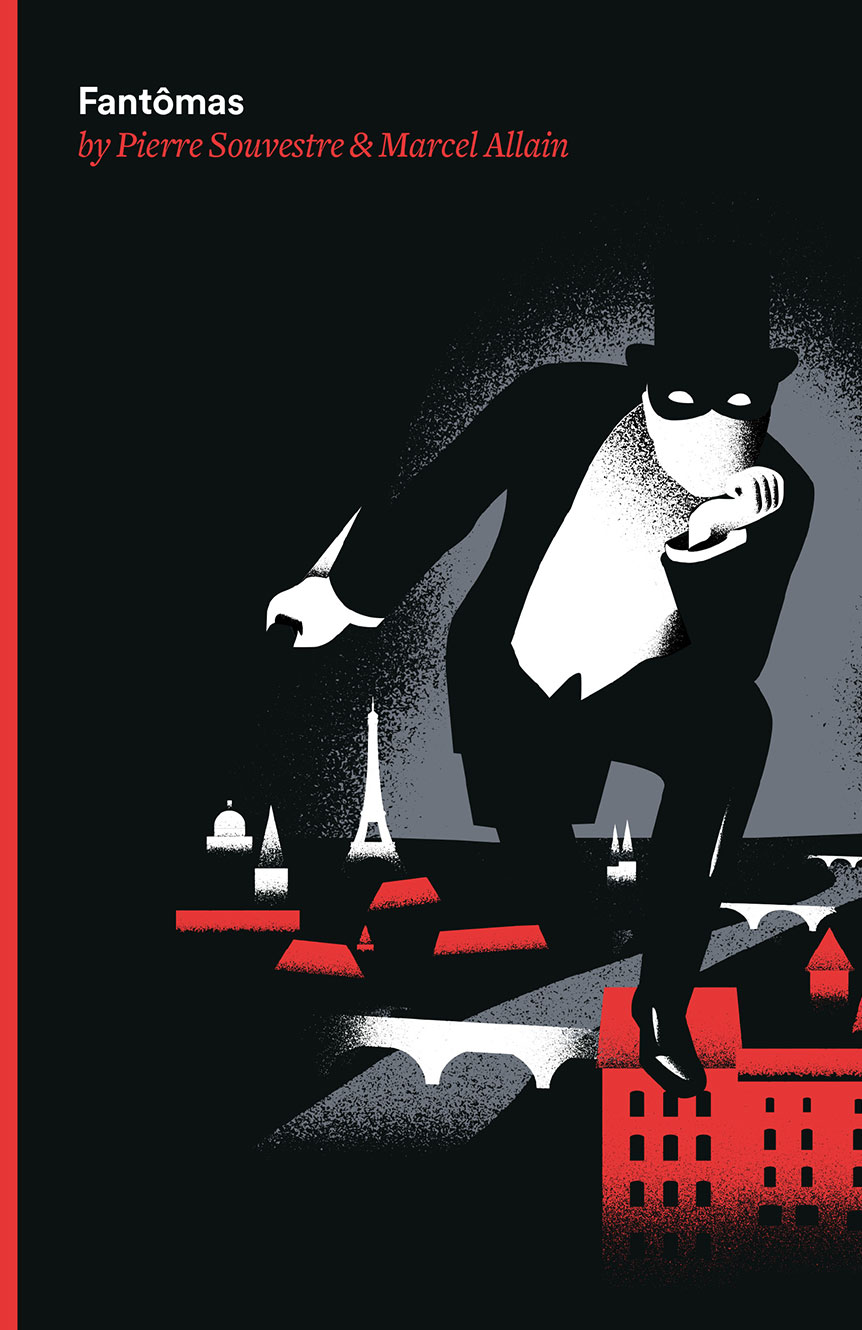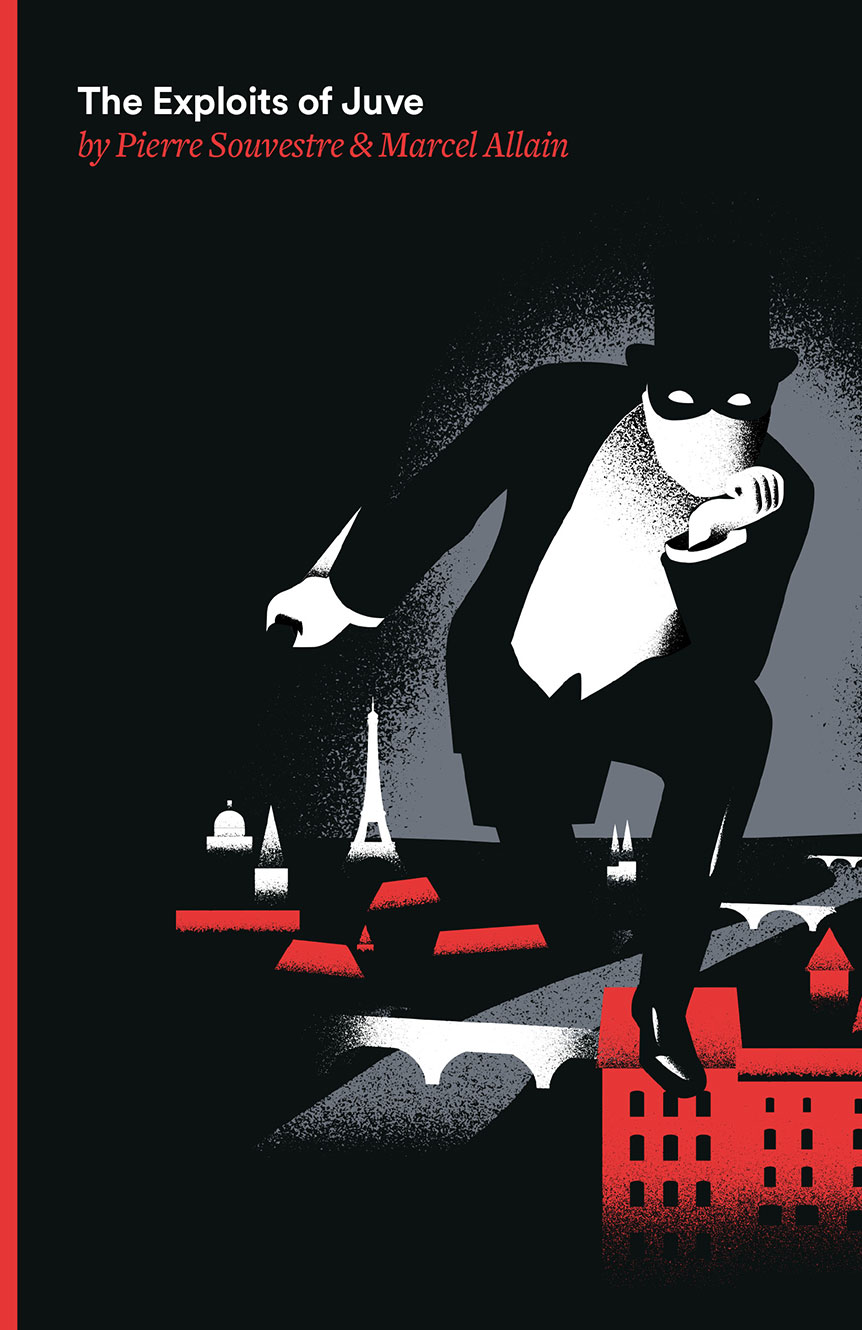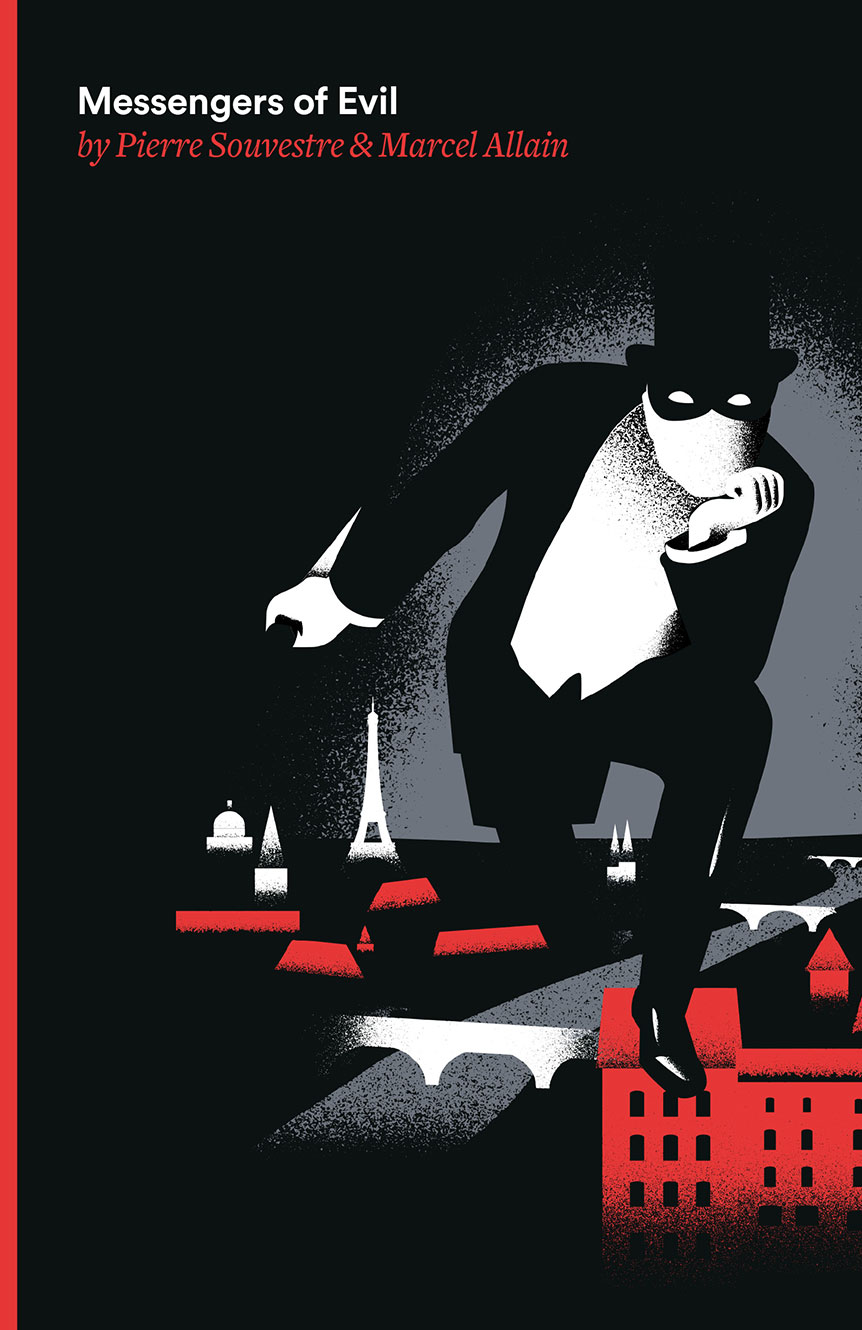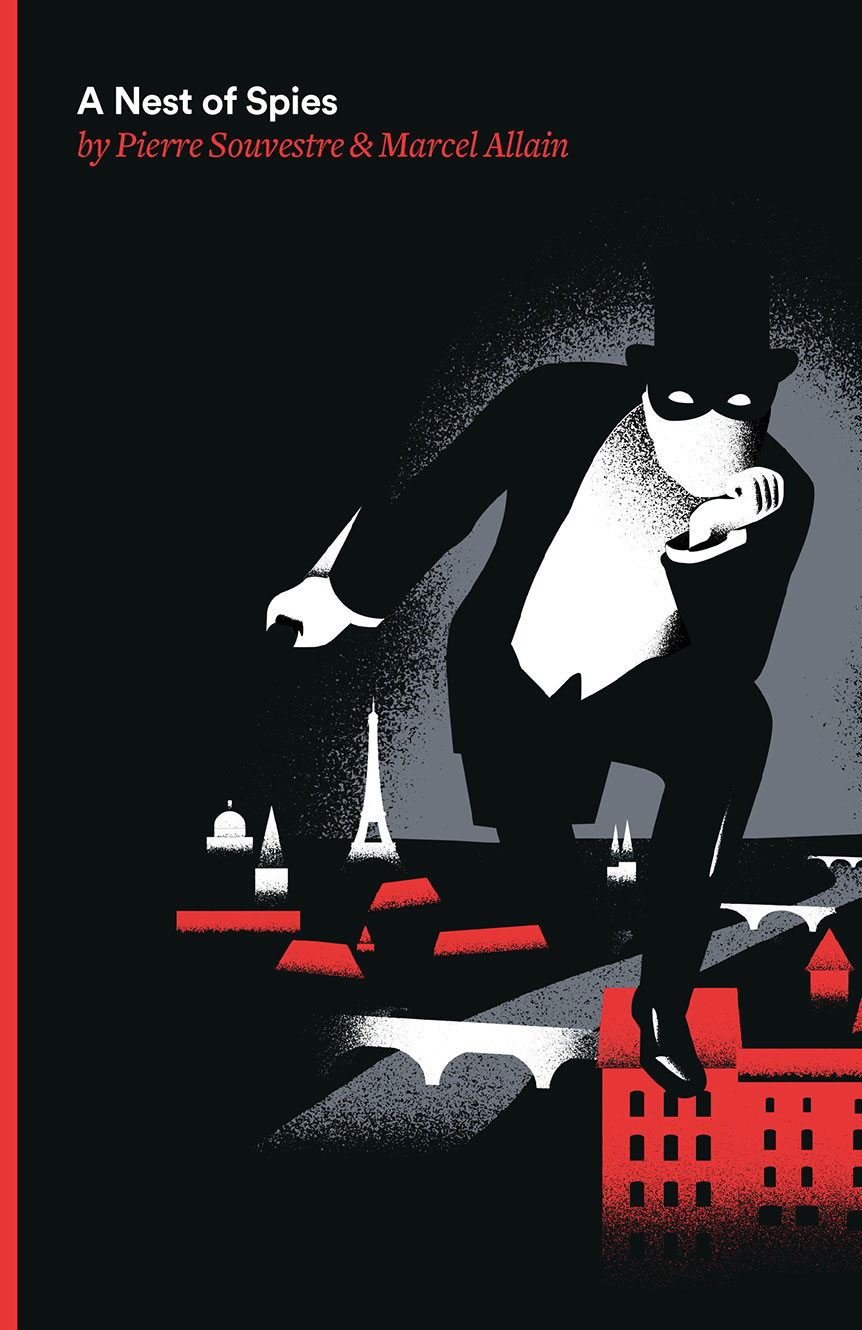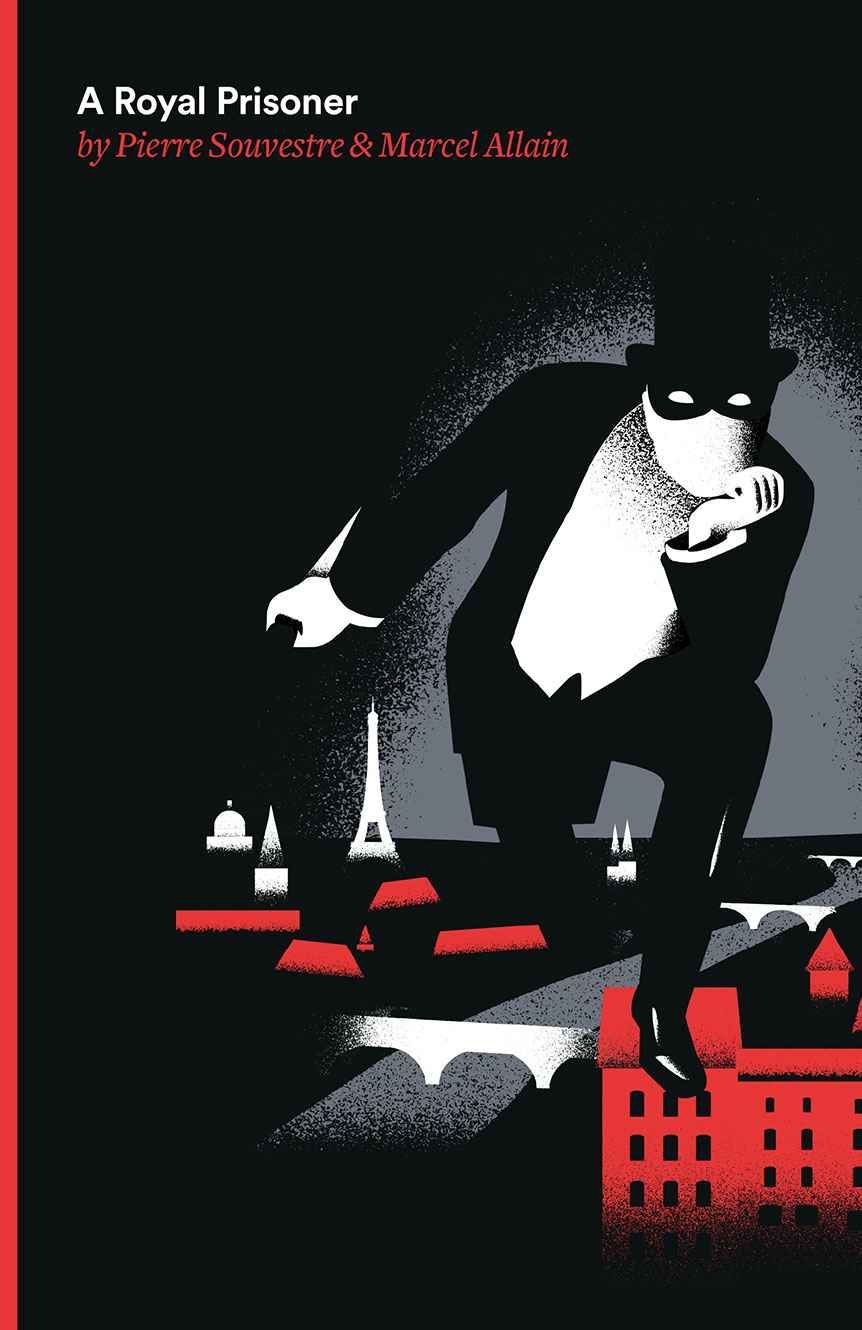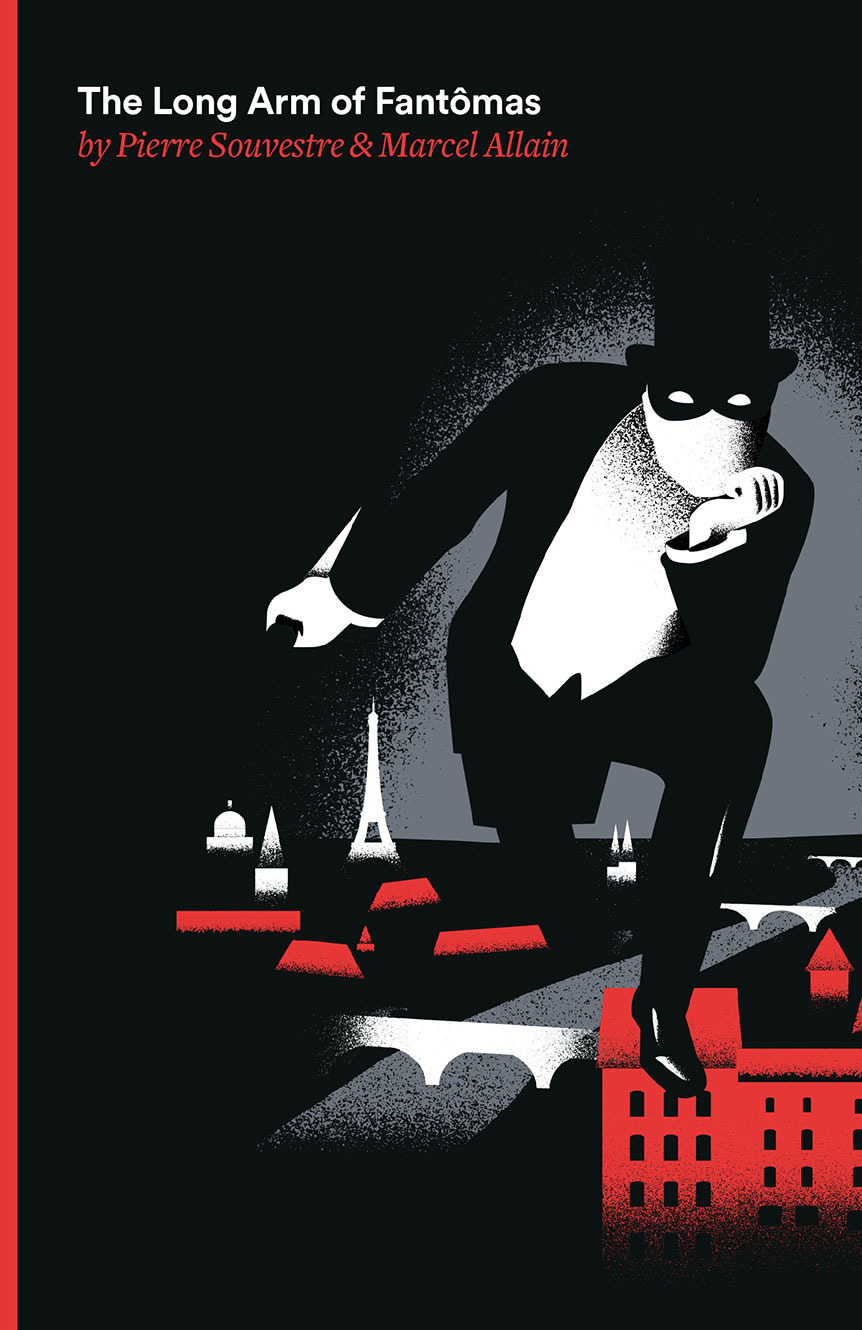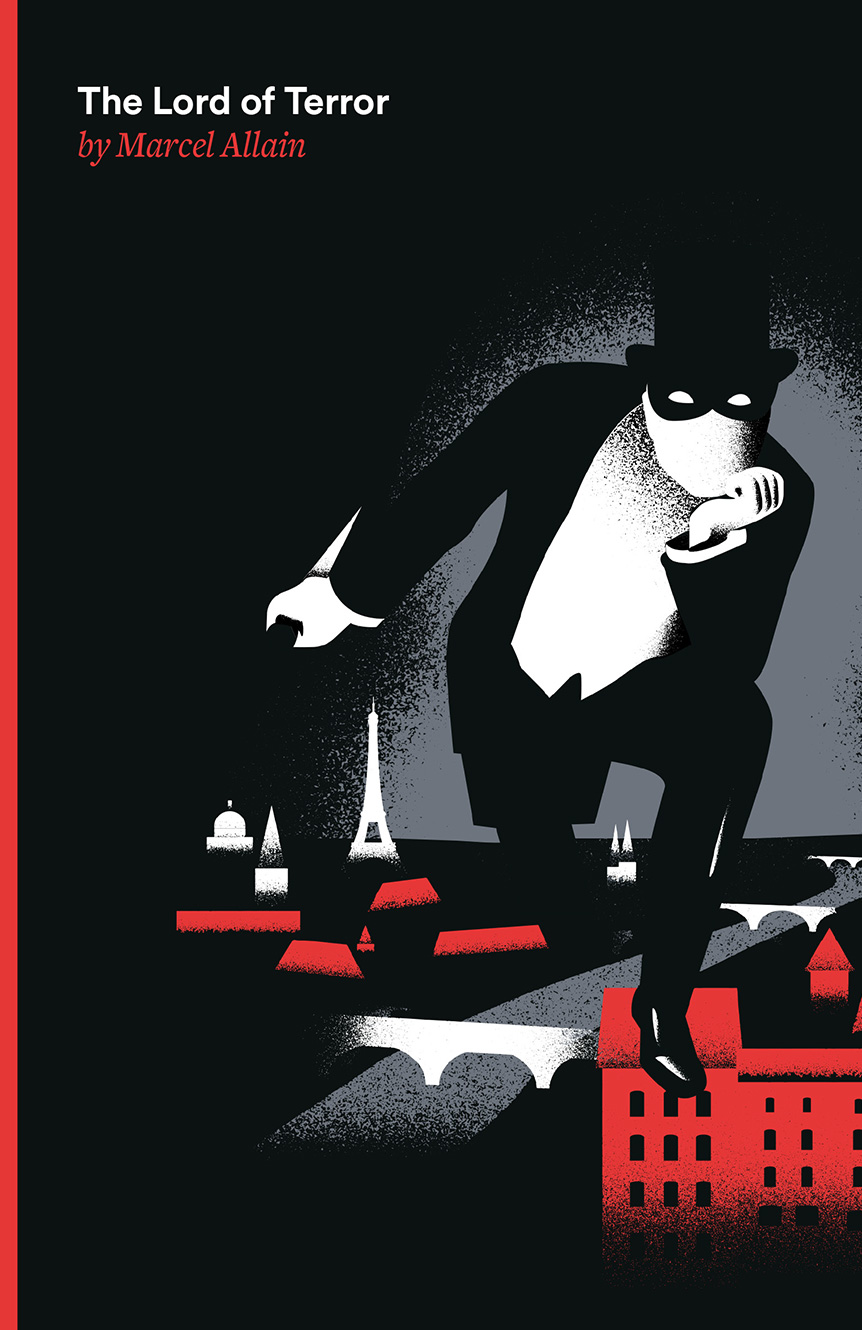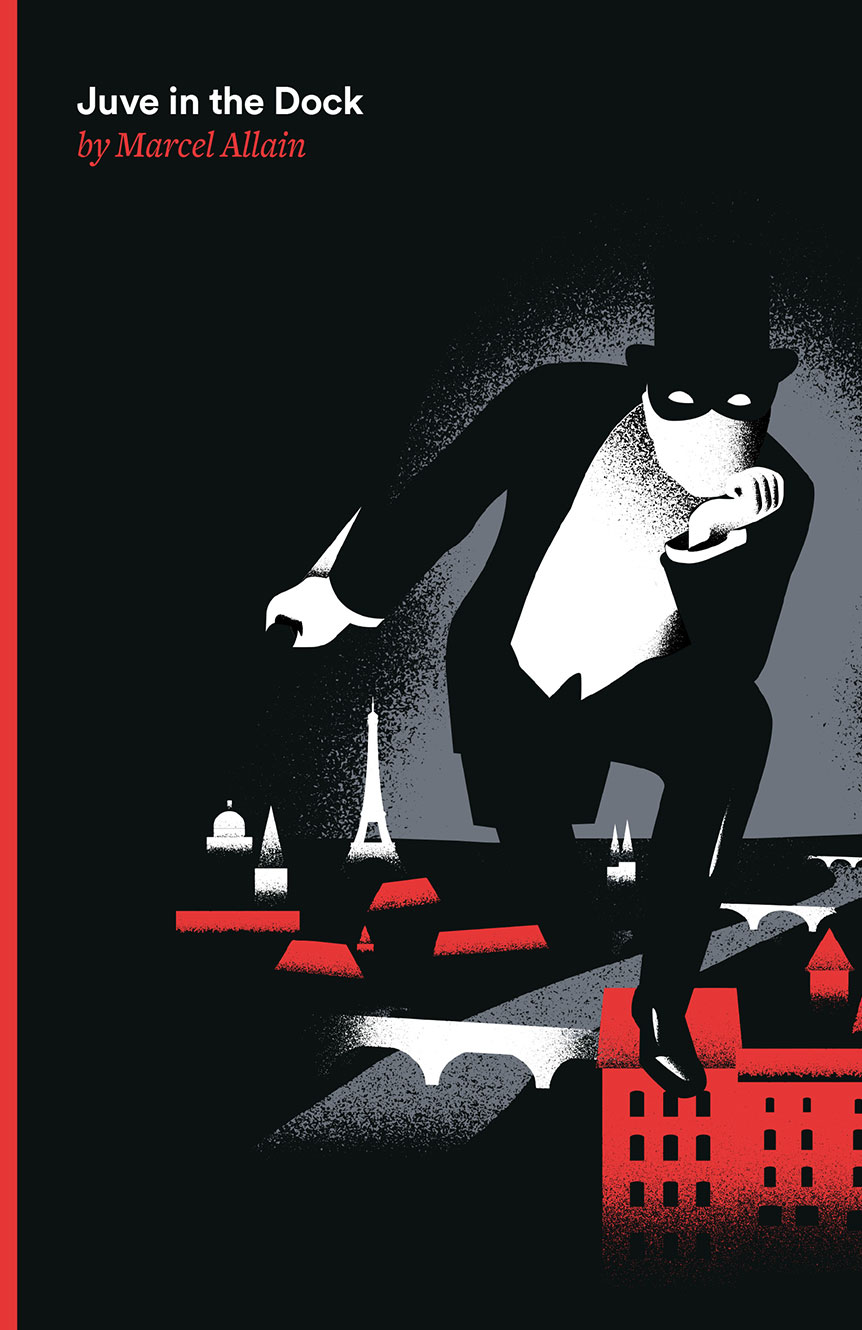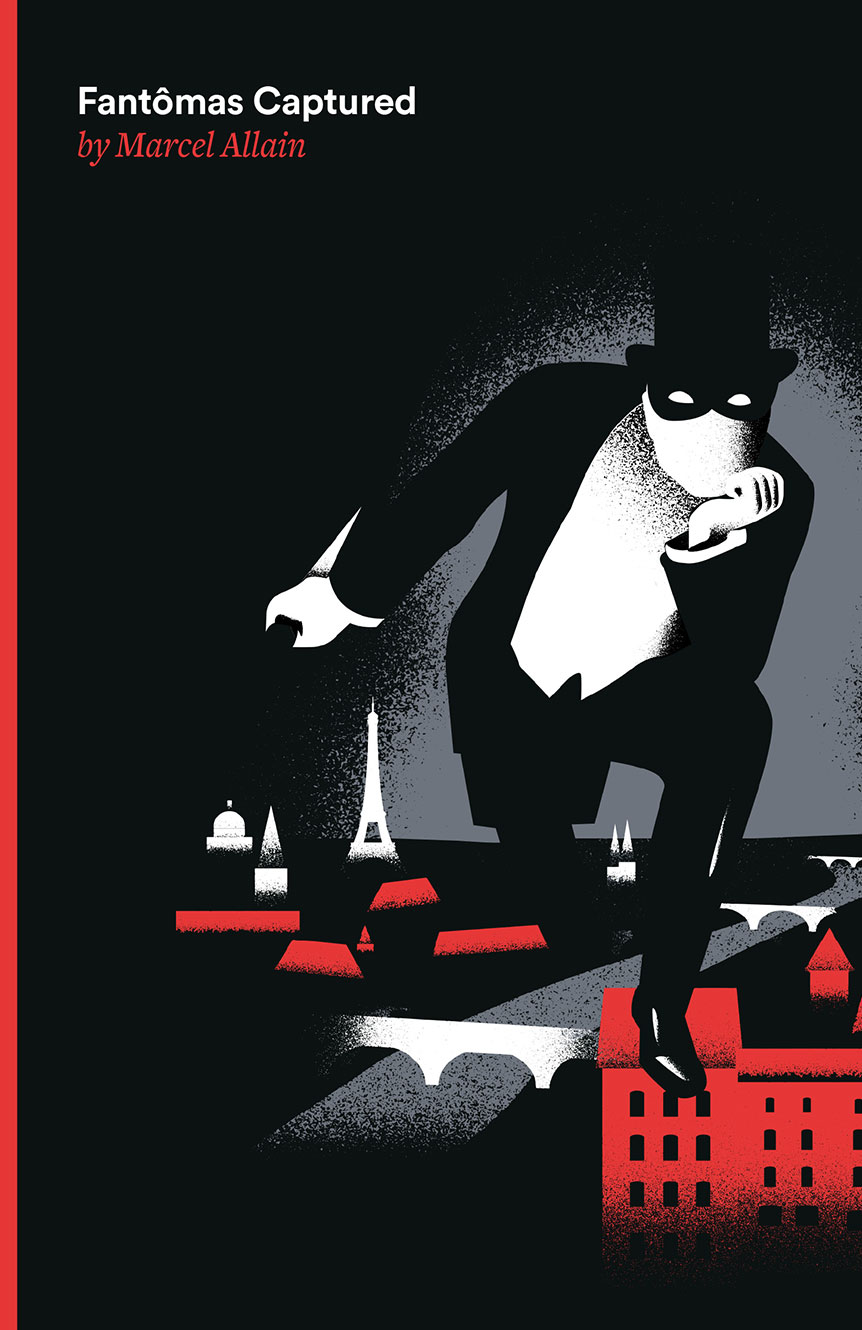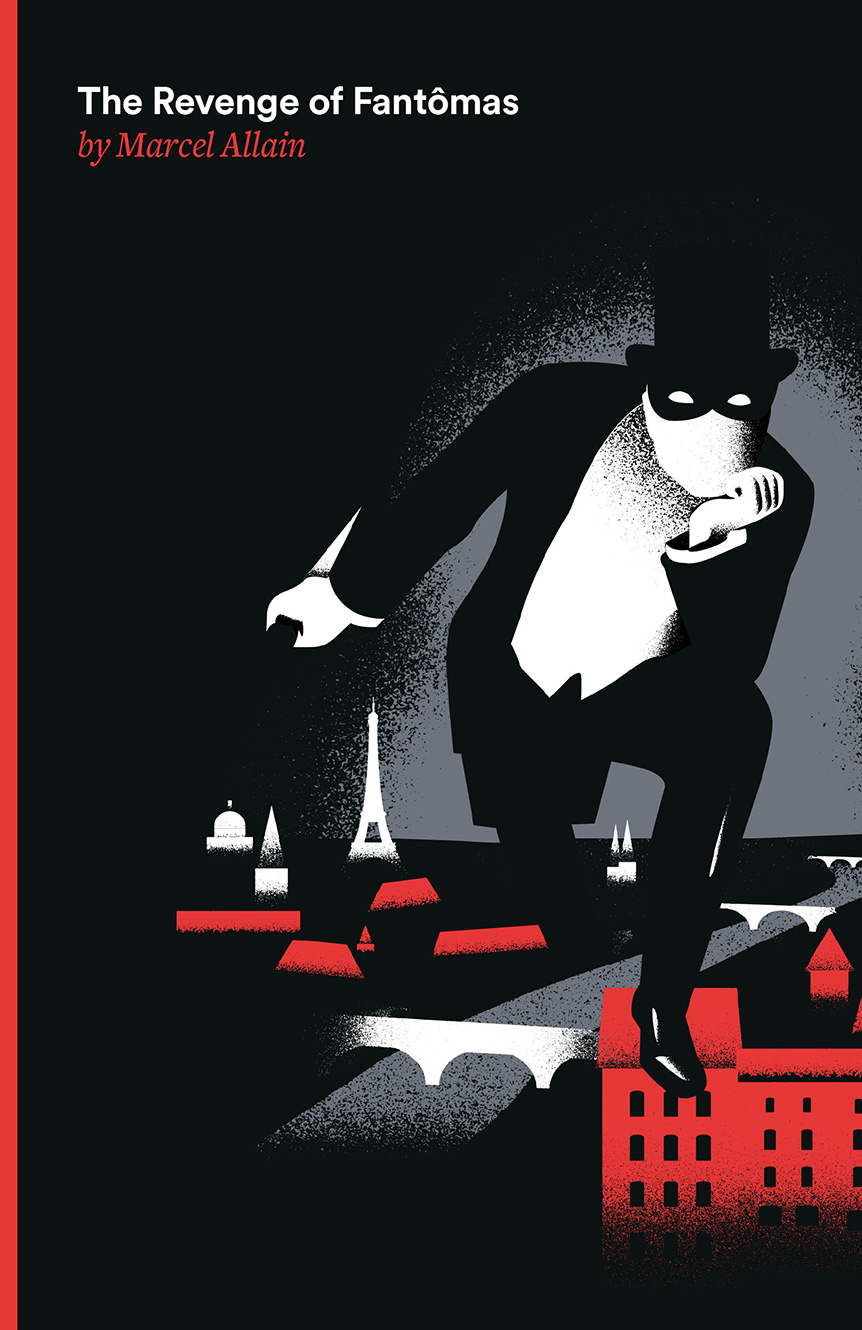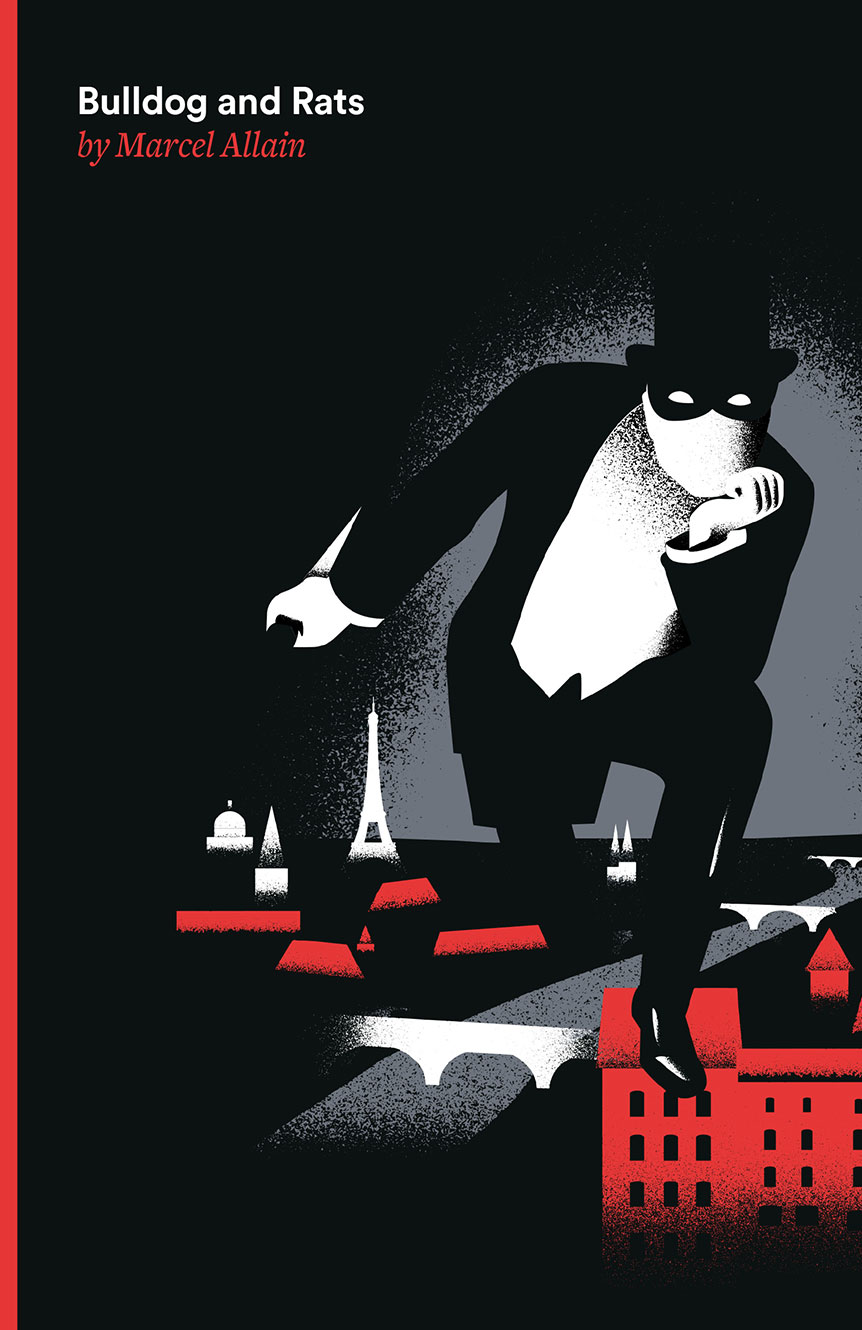Slippery As Sin
Being the Seventh of the Series of Fantômas Detective Tales
Intrepid journalist Jerome Fandor picks up the trail of Fantômas in London, but before he can relay the details to Inspector Juve in Paris, the Lord of Terror pounces. Meanwhile a certain Dr. Garrick, suspected of the murder of his missing wife, flees with his mistress aboard an ocean liner, with Detective Shepard of the “Council of Five” (Scotland Yard’s top agents) in pursuit. Madame Garrick, presumed dead, is in France and could exonerate her estranged husband, but only Juve knows the terrible secret of her true identity.
“From the imaginative standpoint Fantômas is one of the richest works that exist.”
—Guillaume Apollinaire
“Absurd and magnificent lyricism.”
—Jean Cocteau
- Dead Jack
- Jack Alive
- The Hostage
- An Inquest at Putney
- The Departure of The Victoria
- A Drinking Den in the Docks
- The Arrest
- The Mysterious Stranger
- The Innocence of Francoise
- The Supreme Council
- An Examination at Scotland Yard
- Detective and Policeman
- Dark Designs
- The Return of Madame Garrick
- The Supreme Sentence
- A Hooligan’s Crime
- The Amorous Negro
- In a Whiskey Dream
- Policeman 416
- The Supreme Council’s Devotion
- The Game of Cards
- The Compact
- Avenge Me!
- The Capture of Beaumôme
- The Triumph of Juve
- Judge and Accomplice
- The Hangman’s Prerequisites
- The Execution
- Is Fantômas Dead?
- Three Days Hence
1. Dead Jack
“Unbelievable! Dear old Juve! Your news has jolly well pleased me! You can plume yourself on that, old man.”
Jerome Fandor was dancing with joy in his little room, a modest apartment in London he had occupied for the last few months.
Jerome Fandor was talking aloud. There was no one to see, no one to listen.
Every line of his face expressed satisfaction.
The cause of Jerome Fandor’s exuberant gaiety was a telegram in cipher:
“Hurrah, Fandor, Victory, I have just found Lady Beltham again. Fantômas cannot be far off.”
“By Jove!” monologued Fandor. “Juve and I have been so long on the trail of these two sinister bandits that his announcement does not come a day too soon!”
Fantômas had marvelously escaped from Juve and Fandor two years ago, while the French police had let Lady Beltham go free: they lacked proof of identity. Juve and Fandor had lost trace of the terrible bandit who, more than ever, merited the title of “elusive.” They also missed the trail of the great lady, who had been the obvious and the hidden accomplice of Fantômas.
Reduced to despair by the death of Elizabeth Dollon, his ill-fated love, worn out by the Fantômas pursuit, Jerome Fandor went traveling, always keeping in touch with his friend, Inspector Juve of Paris. This celebrated detective had resumed his functions at La Sûreté, where he was glued to the spot for the moment, owing to the accumulation of criminal business requiring his presence.
So Juve had found Lady Beltham again! And Fandor had been on the point of sending a telegram, a most interesting telegram, to his old Paris friend. But second thoughts had caused Fandor to put down his pen.
“No. What I have to tell him is of such importance that not the slightest doubt must remain. Before dispatching my wire I must turn conjecture into certitude.”
Fandor carefully enclosed his translation of Juve’s telegram in his pocketbook, took hat and stick, and stepped out into the sunshine of a radiant April day.
“Another cigarette?”
“Faith, I won’t say no!”
“A tot of whisky? That’s of course.”
“I can’t say no.”
It was about five o’clock in the afternoon of this same April day. Two men were talking amicably in a luxurious room on the first floor of a sumptuous house overlooking Hyde Park. One was Lord Duncan, owner of the house, a tall, fair, distinguished looking man of thirty. His companion, probably some ten years older, had an intelligent face, rather weather-beaten, the face of a man who lives much in the open, goes in for sports, braving sun and rain and all the winds that blow. While Lord Duncan could boast a vigorous growth of thick fair hair, inclined to curl, his companion’s locks were thinning to baldness, and were threaded with grey at the temples.
Lifting his glass, the older man bowed to his host: “My dear Lord Duncan, allow me to congratulate you on your Court appointment.”
Lord Duncan’s reply was a forced smile.
In flattering accents his companion continued:
“The Court is showering honors on you, the worthiest of recipients, my lord, and—”
With a gesture of negation, Lord Duncan interrupted:
“I count as nothing! If Their Majesties consider me it is because of my late father, and in memory of my unfortunate elder brother. Before his death you will remember I was known as Ascott, and it was a great grief to me when I became Duncan.”
“It was Fate, my dear fellow, and you were powerless to prevent it,” declared his companion.
Lord Duncan shook his head:
“No. That motor accident which cost my father and brother their lives, was not the result of chance. They were the victims of a crime, and I believe the odious companions of my abominable wife had some hand in it.”
There was a weighty silence. It was broken by the older man’s decisive words:
“My dear Duncan you are wrong. I assure you I made the most detailed inquiries, and I found nothing abnormal about the accident, quite the contrary. Your father and brother died victims of a fortuitous accident. That I declare on the faith of Tom Bob.”
Lord Duncan uttered a sigh of satisfaction: “Is that so? Who could suspect a crime when Tom Bob, the subtle, the king of detectives, could not discover anything suspicious?”
Duncan turned to his companion with a smile:
“You are the acknowledged king of detectives, Tom Bob, there is no denying that!”
“That is not everybody’s opinion, my dear Duncan. The contrary has been declared of me in the past.”
Tom Bob alluded to rumors whispered by the French police, Inspector Juve among them, some two years before, alleging that Tom Bob, an American detective come to Paris in quest of Fantômas, was none other than Fantômas himself.
This rumor was discredited, and thanks to the protection of his friend, Ascott, Tom Bob entered the English police force, where his influence soon became predominant.
Tom Bob stopped short. Lord Duncan’s glance was on the clock:
“You are expecting someone?”
Lord Duncan reddened:
“I expect my wife, Nini Guinon.”
“Your wife! She dares—”
“I ordered her to come—to bring her son, our little Jack. I have only seen him twice, and he is eighteen months old today. Ah, if only I were not the father of this child! If—”
There was a discreet knock at the door. It half opened. The head of John, the old servant, appeared:
“Excuse me, my lord,” he muttered. “She is here.”
The detective rose.
Lord Duncan looked at Tom Bob:
“Do not go,” he begged. “I should like you to be present at this interview.”
Tom Bob considered a moment:
“Very well. I will be present, but your wife must not be aware of it.”
Tom Bob passed behind a heavy curtain leading to an adjoining apartment.
A minute later a young woman marched into the room. She looked little more than a child. An immense gaudy hat was perched on her untidy black hair. She wore neither veil nor gloves. Her eyes were big and bold and mocking, her lips thick and red, her teeth white, her expression sensual: a flashy beauty, unmistakably French—a Parisienne.
At sight of her Lord Duncan shivered. Scandalized, astonished, he snapped an interrogation at her:
“You have come alone?”
In tones contemptuous and arrogant, her eyes staring defiance, she answered:
“Yes, alone.”
Lord Duncan walked up to her:
“You have disobeyed my orders,” he said harshly. “You must have some serious reason for coming here alone, in spite of my orders. What is that reason?”
The young woman frowned. She put on a sneering look:
“A serious reason? Yes. It would have to be that when I permit myself to come alone to the house of the man who has given me the right to live at his side,” she replied. Her tone was ironical.
“Do not revive these odious memories!” Lord Duncan’s look and voice breathed disgust.
The girl sniggered. She snarled at him:
“Don’t I know well enough that you want to forget that two years ago, you, Ascott the young Englishman who later became Lord Duncan—married me—me, Nini Guinon, a daughter of the people, a little work girl he seduced after an evening’s orgy, and was forced to marry her for fear of reprisals and the police!”
Lord Duncan bent his head. He did not contradict her. The young woman had planted herself near the door. She moved forward:
“Very well. So be it! Forget your wife, but I tell you to forget not only your wife, I tell you to forget all that concerns her.” Her tone threatened.
Lord Duncan feared to grasp her meaning. He questioned with a look this whirlwind in petticoats, now pacing up and down the elegant room. She was panting, bursting with suppressed rage. She stopped, turned, marched up to Lord Duncan.
This wife forced her husband to step back. He recoiled before the insistent menace of her wicked eyes as she confronted him:
“You wanted to take my child from me, you meant to steal my Jack from me! . . . Don’t attempt to deny it!” she shouted, as Lord Duncan made a gesture of denial. “Don’t dare deny it! Because you and your like are rich and powerful you think everything is allowed you. Whatever it may be in your country, I very well know that in France if they tear a child from its mother she lets all the world know it—and I swear to you, Ascott, that I’ll make some music for you, if you—”
“Hold your tongue!” cried Lord Duncan beside himself with anger and disgust. His attitude was so imperious, so formidable that the enraged woman calmed down. “Enough of this play-acting, Nini. Drop your mask. I know you too well. I am not deceived as to the real feelings of what serves you for a heart. Yes, I have wanted to get back your child, my child. I want to save Jack from the horrible existence you are preparing for him. Cursed chance has willed that you should be a mother, but you are not worthy of such a privilege.”
Nini Guinon, crimson with passion, shrieked at Lord Duncan: “You dare! You—”
“Be quiet!” commanded the unfortunate father. His voice softened:
“Alas, Nini, black and bitter with remorse is the day I met you! When I married you to legitimize the child you were to bear me I was a younger on, and did not anticipate my succession to the title and the responsibilities it brought with it. Thus I was obliged to keep our marriage secret. You must admit, madame, that I bought your silence at a high price. I did not intend to forget that I was the husband of my child’s mother. That mother owed it to me to conduct herself with propriety. Your behavior has been the reverse.
“Not only have you blackmailed me perpetually in the most odious manner, but you have led an infamous life. If I insist on taking possession of my child you have only yourself to blame.”
Nini Guinon drew back, glaring savagely at her husband:
“You will not begin this sort of thing again, Lord Duncan,” she snarled at him, “and for this good reason, this very good reason—your son is dead.”
“Jack!” Lord Duncan’s cry was full of anguish. “Jack, my little Jack, dead!” He fell back in his chair.
Nini stared at him, cold, indifferent. She had shot her bolt.
Duncan started up: “Tell me, Nini, how this dreadful thing happened?” His voice was supplicating.
“Jack took cold. A window was open all night. He died next day.”
Duncan walked up to Nini, looked her straight in the eye:
“Is that true?”
His wife did not flinch.
“It is true.”
“Why did you not let me know he was ill?”
“Not I. Bet your life on that!” cried Nini. Duncan rushed at her as though he would strangle her.
Nini jerked out: “He died suddenly!”
A tense silence fell. Duncan strode up and down the room with clenched fists and frowning brow.
Sneering, triumphant, Nini watched him: she had shaken her adversary, dominated him.
Lord Duncan pulled himself together. He faced this detestable woman with the dignity of a peer of the realm:
“Nini Guinon, there was a reason for my indulgence towards you, one only. In spite of your vileness you were a mother, and mother of my son.” Duncan paused. Then gravely, in a low troubled voice, he continued:
“God has taken the child, perhaps for the best. It is the punishment imposed on me for my sin.”
A burst of cynical laughter was Nini Guinon’s reply.
Lord Duncan stiffened:
“Now there remains only husband and wife, between whom yawns an impassable gulf. You, madame, have again and again merited imprisonment. You have been the accomplice of the most degraded creatures in London. Again and again I have intervened to save you from the consequences of your actions. Nini Guinon you are a criminal. I tell you that you shall leave here only to enter a jail. An inquiry shall be opened to discover how my son died. This inquiry will, no doubt, lay bare many things.”
At these words Nini Guinon paled:
“You are going to have me arrested!” she cried. “Don’t forget that you will let all the world know of your marriage!”
“Well I know it, madame. I shall put up with the scandal.”
Nini Guinon trembled. If her husband was prepared to face the scandal of their marriage, she would no longer be able to threaten and blackmail him—she was done for . . .
Lord Duncan walked up and down, a prey to the most sinister reflections.
Nini Guinon moved off to the far end of the room. She was desperately alarmed. What should she do? As she stood near the velvet curtain she heard a voice behind her murmur: “Imbecile!”
She smothered a cry.
The voice continued: “Fool of a Nini, listen. Keep quiet!”
Though startled, astounded, Nini managed to preserve an impassive face and a still body.
“Imbecile to say Jack is dead—Jack dead you are lost beyond hope—but there is still time to retrieve the blunder—invent no matter what—swear that he he is living, swear it—if you want to live, Nini, do not hesitate.”
Nini’s ears were a-stretch. She watched her husband out of the corner of her eye, terrified lest he should catch a sound. Lord Duncan was so absorbed in bitter reflections that he noticed nothing.
Nini was herself again and ready to play her part:
“Lord Duncan!” she murmured.
“What is it?”
Nini Guinon’s attitude was now one of humble repentance. She was kneeling with clasped hands. Sobs punctuated her words:
“Forgive me, Lord Duncan! I have lied to you. My mother’s heart inspired the untruth. When you wanted to take my little Jack from me, the one being left me to cherish, I was mortally frightened. Hoping you would then leave me in peace with him, I told you he was dead. But I see that grieves you too much, and I myself will not continue such a dreadful deception. Jack lives, Lord Duncan! My little Jack, and yours!”
Astonished, suspicious, Lord Duncan asked himself if this was not some frightful comedy, but Nini Guinon knew how to lend sincerity to her tones. It was only too easy to touch the heart of this father so willing to believe in the existence of his little son.
“You swear to me that Jack, my Jack is living?”
“I swear it,” cried Nini Guinon. Tears were running down her cheeks.
In spite of instinct and reason, Lord Duncan was softened by his wife’s emotion, degraded though she might be. Was he not the primary cause of her fall? he asked himself. While he had risen to a high place in the world had not this wretched woman sunk lower and lower?
“Poor unfortunate,” murmured Lord Duncan.
Nini Guinon saw at a glance that she had regained her hold on this man.
“Promise me,” she implored, “not to take my child from me, and I will try to behave better!”
“Is that possible Nini?”
“I will truly try.”
The simple young peer was favorably impressed. Nini grew bolder:
“Misery is a bad counselor, my lord. I must nourish my child and myself, and I am not rich. . . .”
Lord Duncan drew a bundle of notes from his pocketbook, saying with a bitter smile:
“When I received your letter this morning announcing your visit, I had this money in readiness. Take it!”
Nini Guinon put out her hand.
“A moment,” said Lord Duncan.
Nini’s countenance fell.
“Oh, the condition I impose is not painful. I wish to see my child. I am determined to see him—absolutely. Four days from this, at nine o’clock in the morning precisely, you must be in Hyde Park with little Jack. That is agreed, is it not?”
Nini Guinon looked at her husband with open face and frank eye:
“It’s give and take,” she smiled. “Very well, I accept the bargain. You can hand over the money. Till Wednesday then, my lord.”
Nini Guinon had barely left the room when the heavy curtain between it and the room adjoining, moved. Tom Bob appeared.
Lord Duncan went over to him. He seized the detective’s hands and pressed them:
“Well, my dear Tom Bob, have you heard the conversation?”
“I heard everything.”
“What do you think of it? Can one believe this woman? She lies so well that it seems impossible to distinguish her lies from the truth. Is my little Jack dead or alive?”
Tom Bob smiled:
“The question is easily answered.”
“You will look into the matter for me?”
“I was about to suggest it, my lord. In forty-eight hours you will be satisfied.”
“God grant it.”
“I am convinced your child lives.”
Tom Bob seemed in a hurry to leave. He wrung Lord Duncan’s hand warmly, and as he left the room repeated:
“Count on me.”
(End of Chapter 1 of Slippery As Sin)
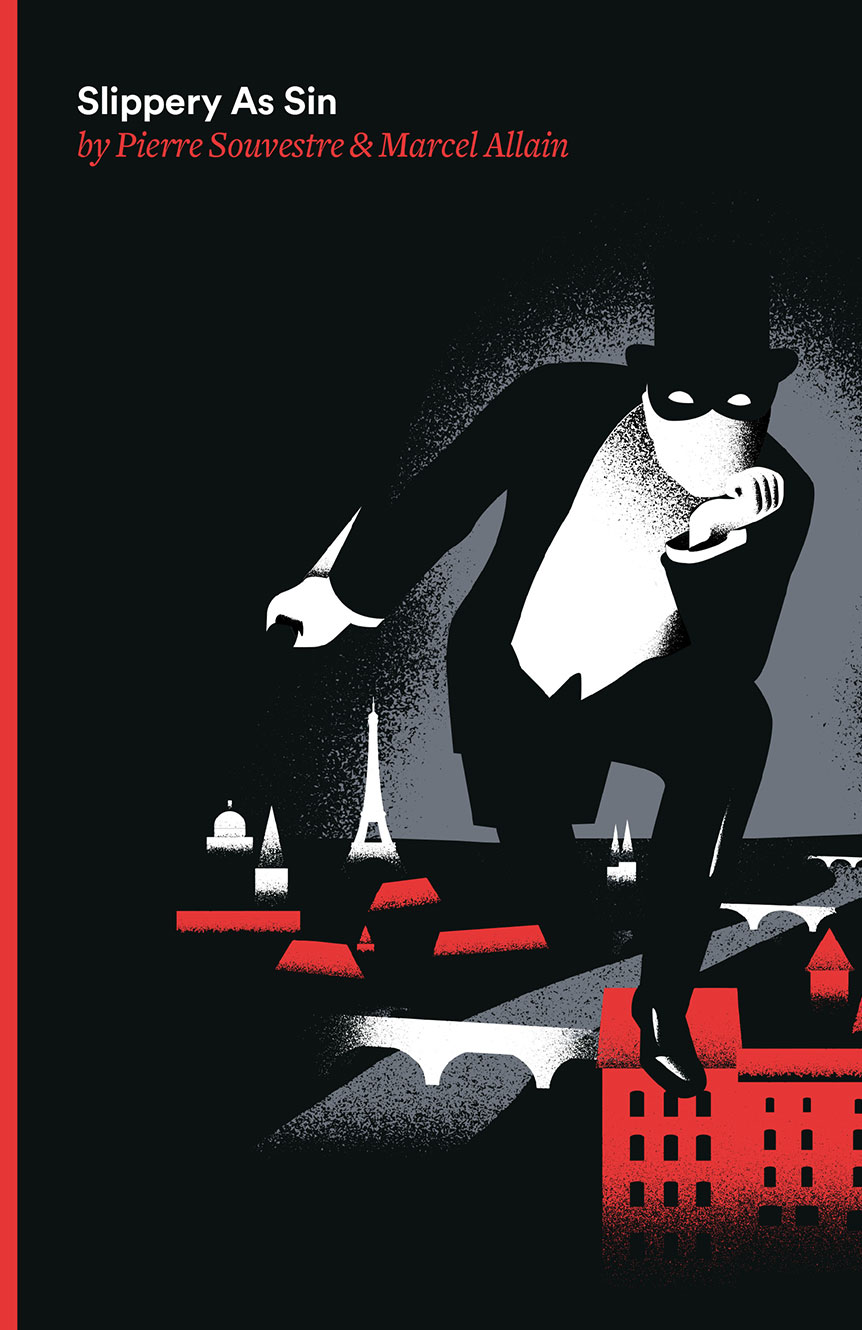
This Antipodes edition, first published in 2016, is a republication of the work first published by Stanley Paul & Co., London, in 1920. The translation has been slightly altered to reflect modern spelling and usage. Originally published in French as Le Pendu de Londres in 1911.
ISBN: 978-0-9966599-2-5
240 pages
Antipodes books are distributed worldwide by Ingram Content Group
